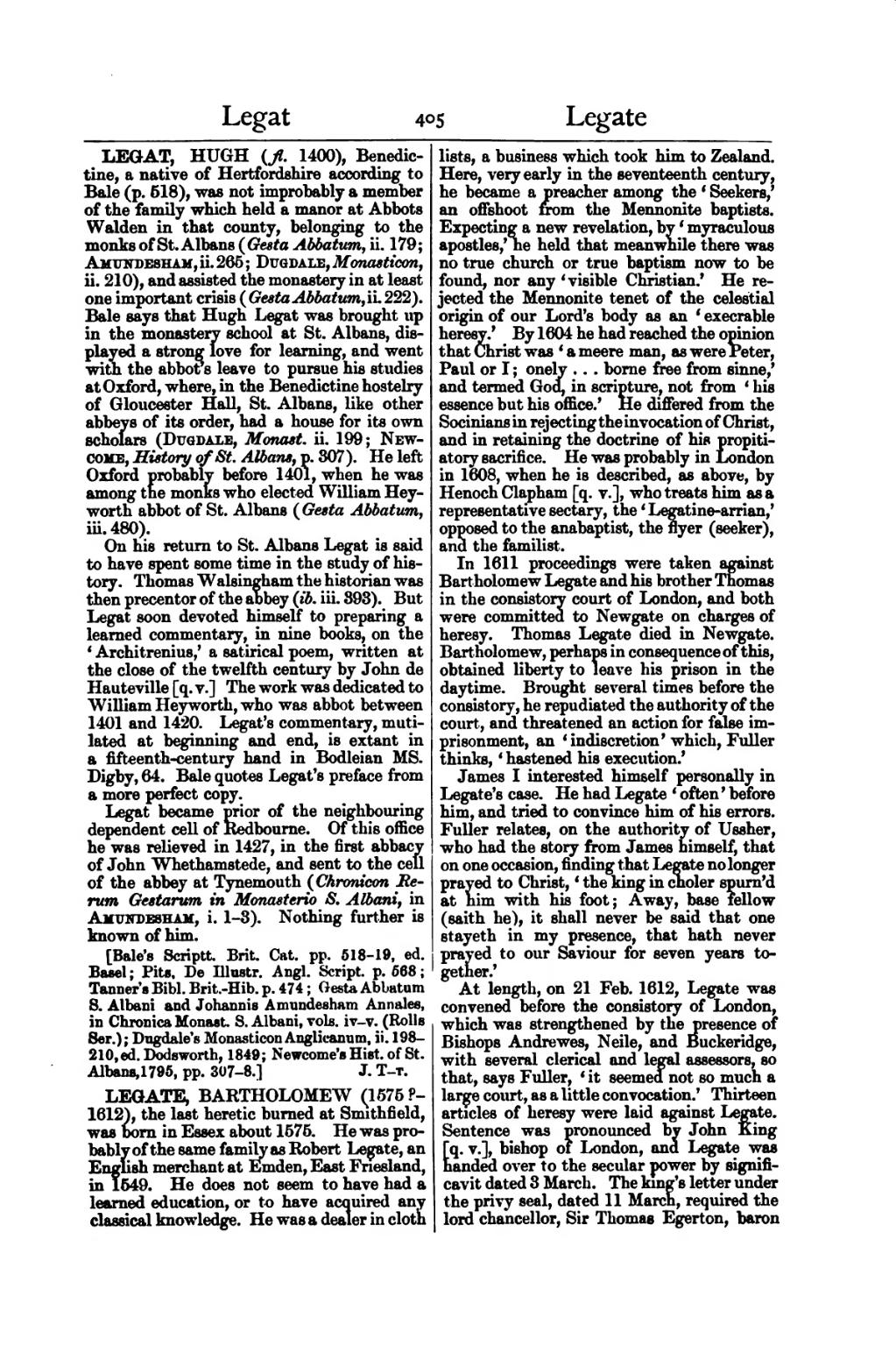LEGAT, HUGH (fl. 1400), Benedictine, a native of Hertfordshire according to Bale (p. 518), was not improbably a member of the family which held a manor at Abbots Walden in that county, belonging to the monks of St. Albans (Gesta Abbatum, ii. 179; Amundesham, ii. 265; Dugdale, Monasticon, ii. 210), and assisted the monastery in at least one important crisis (Gesta Abbatum, ii. 222). Bale says that Hugh Legat was brought up in the monastery school at St. Albans, displayed a strong love for learning, and went with the abbots leave to pursue his studies at Oxford, where, in the Benedictine hostelry of Gloucester Hall, St. Albans, like other abbeys of its order, had a house for its own scholars (Dugdale, Monast. ii. 199; Newcome, History of St. Albans, p. 807). He left Oxford probably before 1401, when he was among the monks who elected William Heyworth abbot of St. Albans (Gesta Abbatum, iii.480).
On his return to St. Albans Legat is said to have spent some time in the study of history. Thomas Walsingham the historian was then precentor of the abbey (ib. iii. 893). But Legat soon devoted himself to preparing a learned commentary, in nine books, on the 'Architrenius,' a satirical poem, written at the close of the twelfth century by John de Hauteville [q. v.] The work was dedicated to William Heyworth, who was abbot between 1401 and 1420. Legat's commentary, mutilated at beginning and end, is extant in a fifteenth-century hand in Bodleian MS. Digby, 64. Bale quotes Legat's preface from a more perfect copy.
Legat became prior of the neighbouring dependent cell of Redbourne. Of this office he was relieved in 1427, in the first abbacy of John Whethamstede, and sent to the cell of the abbey at Tynemouth (Chronicon Rerum Gestarum in Monasterio S. Albani, in Amundesham, i. 1-3). Nothing further is known of him.
[Bale's Scriptt. Brit. Cat. pp. 518–19, ed. Basel; Pits, De Illustr. Angl. Script. p. 568; Tanner's Bibl. Brit.-Hib. p. 474; Gesta Abbatum S. Albani and Johannis Amundesham Annales, in Chronica Monast. S. Albani, vols. iv–v. (Rolls Ser.); Dugdale's Monasticon Anglicanum, ii. 198–210, ed. Dodsworth, 1849; Newcome's Hist. of St. Albans, 1795, pp. 307–8.]
LEGATE, BARTHOLOMEW (1575?–1612), the last heretic burned at Smithfield, was born in Essex about 1575. He was probably of the same family as Robert Legate, an English merchant at Emden, East Friesland, in 1549. He does not seem to have had a learned education, or to have acquired any classical knowledge. He was a dealer in cloth lists, a business which took him to Zealand. Here, very early in the seventeenth century, he became a preacher among the 'Seekers,' an offshoot from the Mennonite baptists. Expecting a new revelation, by 'myraculous apostles.' He held that meanwhile there was no true church or true baptism now to be found, nor any 'visible Christian.' He rejected the Mennonite tenet of the celestial origin of our Lord's body as an 'execrable heresy.' By 1604 he had reached the opinion that Christ was 'a meere man, as were Peter, Paul or I; onely . . . borne free from sinne,' and termed God, in scripture, not from ' his essence but his office.' He differed from the Socinians in rejecting the invocation of Christ, and in retaining the doctrine of his propitiatory sacrifice. He was probably in London in 1608, when he is described, as above, by Henoch Clapham [q. v.], who treats him as a representative sectary, the 'Legatine-arrian,' opposed to the anabaptist, the flyer (seeker), and the familist.
In 1611 proceedings were taken against Bartholomew Legate and his brother Thomas in the consistory court of London, and both were committed to Newgate on charges of heresy. Thomas Legate died in Newgate. Bartholomew, perhaps in consequence of this, obtained liberty to leave his prison in the daytime. Brought several times before the consistory, he repudiated the authority of the court, and threatened an action for false imprisonment, an 'indiscretion' which, Fuller thinks, 'hastened his execution.' James I interested himself personally in Legate's case. He had Legate ' often' before him, and tried to convince him of his errors. Fuller relates, on the authority of Ussher, who had the story from James himself, that on one occasion, finding that Legate no longer prayed to Christ, ' the king in choler spurn'd at him with his foot; Away, base fellow (saith he), it shall never be said that one stayeth in my presence, that hath never prayed to our Saviour for seven years together.'
At length, on 21 Feb. 1612, Legate was convened before the consistory of London, which was strengthened by the presence of Bishops Andrewes, Neile, and Buckeridge, with several clerical and legal assessors, so that, says Fuller, 'it seemed not so much a large court, as a little convocation.' Thirteen articles of heresy were laid against Legate. Sentence was pronounced by John King [q. v.], bishop of London, and Legate was handed over to the secular power by significavit dated 3 March. The king's letter under the privy seal, dated 11 March, required the lord chancellor, Sir Thomas Egerton, baron
